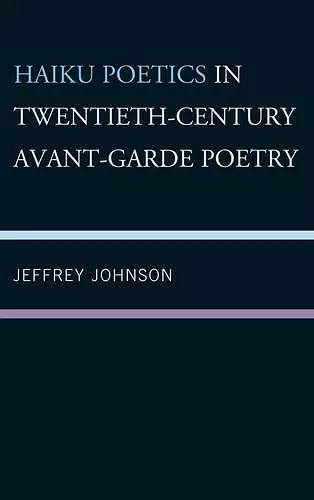Haiku Poetics in Twentieth Century Avant-Garde Poetry
Format:Hardback
Publisher:Bloomsbury Publishing PLC
Published:27th Oct '11
Currently unavailable, and unfortunately no date known when it will be back

A masterful exposition of the world-wide blending of Eastern poetics and Western praxis. -Lee Gurga, ed. Modern Haiku Press This is a highly ambitious, groundbreaking study. Taking the poetics of haiku as a starting point, Jeffrey Johnson covers a vast terrain of haiku's influences, adaptations, and transfigurations in Western literary modernisms. In the process haiku itself dazzlingly resurfaces as a modernist practice of visual analogy and synaesthetic correspondences. Its traces are everywhere: Pound and Lowell to the Beats, Eluard and Lorca, Tablada in Mexico and Xisto and de Campos in Brazil. Of particular interest is Johnson's attention toward hispano- and lusophone avandgarde poets. Haiku as an art of brevity and abrupt juxtaposition of concrete images has thus become an indispensable, dynamic component of world poetics of the twentieth century and beyond.-Keijiro Suga, Meiji University
Haiku Poetics in Twentieth Century Avant-Garde Poetry is the first study to examine the historical importance of haiku in theorizing a global poetic, tracing its spread from translations to practice, and following its permutations into diverse modernist avant-garde poetry. While Haiku Poetics is an investigation into the cultural borrowing of haiku, it also documents interpretation and transformation, as even the translators George Aston and Paul-Louis Couchoud moved beyond translation in the acquisition of haiku. The French translations focused on Yosa Buson's visual haiku, while the English prioritized Matsuo Bash?'s lyricism. After the first translations, haiku was disseminated throughout the world of poetry. This book argues that haiku grew out of a broad Japonisme and was on the cusp of the Modernist transformation of western art, and viewed over the course of the century, haiku would serve as the most important model for Modernist reformers.
Through a hybrid of Buddhist and avant-garde theories, Haiku Poetics reveals that haiku and its permutations deploy concrete particulars in abrupt juxtaposition to engage the reader's intuitive apprehension, and suggest via images which must be shaped into allegories. The push to collapse poetry into the act of the perception of objects in the phenomenological world means that this poetry conjures from the unconscious to the physical, and in so doing, evokes greater creative processes. The poets swept up in this haiku revolution that this book examines include Ezra Pound, Paul Eluard, Fededrico García Lorca, Guillermo de Torre, José Juan Tablada, Octavio Paz, Jorge Luis Borges, among others.
A masterful exposition of the world-wide blending of Eastern poetics and Western praxis. -- Lee Gurga, editor of Modern Haiku Press
This is a highly ambitious, groundbreaking study. Taking the poetics of haiku as a starting point, Jeffrey Johnson covers a vast terrain of haiku’s influences, adaptations, and transfigurations in Western literary modernisms. In the process haiku itself dazzlingly resurfaces as a modernist practice of visual analogy and synaesthetic correspondences. Its traces are everywhere: Pound and Lowell to the Beats, Eluard and Lorca, Tablada in Mexico and Xisto and de Campos in Brazil. Of particular interest is Johnson’s attention toward hispano- and lusophone avandgarde poets. Haiku as an art of brevity and abrupt juxtaposition of concrete images has thus become an indispensable, dynamic component of world poetics of the twentieth century and beyond. -- Keijiro Suga, Meji University
With his painstaking research alongside lyrical insights, Johnson reveals both a personal and academic relationship with haiku and its historical significance. * The Japan Times *
Jeffrey Johnson’s Haiku Poetics in Twentieth-Century Avant-Garde Poetry provides a valuable resource to poetry scholars. For the first time, a full-length study demonstrates the intertextual relationship between haiku and twentieth-century avant-garde poetry. * Juxta *
ISBN: 9780739148761
Dimensions: 240mm x 162mm x 24mm
Weight: 553g
262 pages